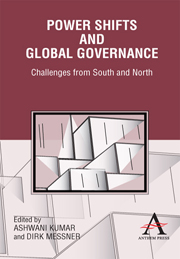Book contents
- Frontmatter
- Contents
- List of Contributors
- Foreword
- Power Shifts and Global Governance
- Part One Theoretical and Analytical Reflections on Global Governance
- 1 Introduction: Global Governance: Issues, Trends and Challenges
- 2 Four Lessons from the Present Global Financial Crisis for the 21st Century: An Essay on Global Transformation from a European Perspective
- 3 Global Civil Society: Emergent Forms of Cosmopolitan Democracy and Justice
- 4 Institutional and Policy Implications of International Public Goods: The Case of Global Commons
- 5 Economic Challenges for Global Governance
- 6 The Rule of Law in Multilateral Institutions and International Aid for Development: Judicial Reform in the Global Order
- Part Two Power Shifts, Regional Experiences and Global Challenges
- Part Three Case Studies in Global Governance
- Notes
2 - Four Lessons from the Present Global Financial Crisis for the 21st Century: An Essay on Global Transformation from a European Perspective
from Part One - Theoretical and Analytical Reflections on Global Governance
Published online by Cambridge University Press: 05 March 2012
- Frontmatter
- Contents
- List of Contributors
- Foreword
- Power Shifts and Global Governance
- Part One Theoretical and Analytical Reflections on Global Governance
- 1 Introduction: Global Governance: Issues, Trends and Challenges
- 2 Four Lessons from the Present Global Financial Crisis for the 21st Century: An Essay on Global Transformation from a European Perspective
- 3 Global Civil Society: Emergent Forms of Cosmopolitan Democracy and Justice
- 4 Institutional and Policy Implications of International Public Goods: The Case of Global Commons
- 5 Economic Challenges for Global Governance
- 6 The Rule of Law in Multilateral Institutions and International Aid for Development: Judicial Reform in the Global Order
- Part Two Power Shifts, Regional Experiences and Global Challenges
- Part Three Case Studies in Global Governance
- Notes
Summary
All ages come to an end. The Ice Age was succeeded by the Bronze Age, the Renaissance was followed by the Reformation, great powers have succeeded one another, Rome, Great Britain, the US(Senge et al. 2008, 7). Nothing's here to stay. With the present financial crisis, another age is drawing to a close – but not, as many globalization critics may think with glee, the age of globalization. What we now see going down is an international order in which the Western societies are the center and the measure of all things (the G7 is a reflection of this eroding constellation of power), the age of industrialization (based as it was on the delusion of an infinite supply of natural resources and infinite capacities of the atmosphere, the oceans and the global forests to absorb greenhouse gas emissions and other collateral wastes of our consumption patterns), and the illusion that the nation-state could, despite accelerating globalization, somehow just muddle on as it has in the course of the past 200 years. The concern now is to create a truly viable, sustainable globalization that accepts the global challenges of the twenty-first century.
- Type
- Chapter
- Information
- Power Shifts and Global GovernanceChallenges from South and North, pp. 31 - 44Publisher: Anthem PressPrint publication year: 2010

